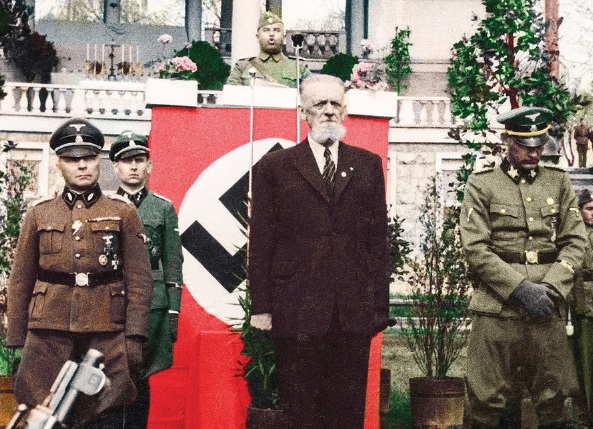Tomatolake
Tyro
 Death to the Japanese, Pagan, Yorkshireman
Death to the Japanese, Pagan, Yorkshireman
Posts: 27 
|
Post by Tomatolake on Oct 4, 2019 6:49:13 GMT -5
Some men or women devote their entire lives to one cause or the other. Others bend with the wind flittering from one camp to the other as times change others just enjoy screwing people over. Who do you think has played for the most sides??
The obvious answer would be Alcibiades whom no one was ever sure which side he was on flitting between Athens, Sparta or the Achaemenid Empire.
I just learnt about Otto Skorzeny who on the surface would appear to simply have just been a loyal Nazi soldier; but it was after the war when he really began to play the game. As far as we are aware he worked for an ex-Nazi organisation, the KGB, the CIA, Mossad (yes he did) and even the Papacy, and that's just the organizations that we know about.
|
|
|
|
Post by Windischer on Mar 29, 2020 12:07:29 GMT -5
Lauri Törni (Larry Thorne) is somewhat of a famous figure, who just wanted to fight communists no matter for which side. So he was first in the Finnish army, then joined the Waffen SS and after ww2 he went to America, where he became a Green Beret. He died on a mission in Laos.  Then there's Leon Rupnik, who is probably quite unknown outside Slovenia. He went to a cadet school in Triest in Austria-Hungary, later also the Generalstabsschule in Vienna. He fought as an officer in the Austrian-Hungarian army against the Serbs, Italians and Russians and was decorated numerous times. From 1919 onwards he was in the army of the Kingdom of Yugoslavia, where he made a good cereer as well. By 1937 he was a division general. There is even a defensive line named after him west of Ljubljana, close to the border with Italy at that time. Yugoslavia was defeated very quickly in April 1941, which put him out of work. He was an oponent of communism, which made him a target of the communist resistance, but in 1942 he was nevertheless interned with other former Yugoslav officers in the Italian prisoner camp in Gonars. Because he was older than 55 he was released that same year and could return to Ljubljana. That year he started collaborating with the Italian occupying forces and became the mayor of Ljubljana. Rupnik was the one to bring forth the idea of special Slovene units helping the Italians to fight the communists, who gained the upper hand in the armed resistance movement as he saw the communists as a greater threat than the fascist and nazi occupiers. This action made him very unpopular with many Slovenes though and the exiled Yugoslav government in London even took away his rank of general. So first the Italians organised the MVAC (milizie volontarie anticomunista) - the "Village Guard" and the "Legion of Death", which fought against the partisans. After Italy capitulated in 1943, the partisans defeated these forces, but the Germans took over most of the territory formerly occupied by Italy. Rupnik's antisemitism helped him establish good relations with the nazis, who then established the Slovene Landwehr (btw, there's a special connection between the Landwehr and Odilo Globočnik, a highranking Austrian-Slovenian SS officer) to continue the fight against the partisans. Rupnik became the leader of this new organisation, but this was merely on paper as the Germans wouldn't let him too much real power for practical reasons. Nevertheless Rupnik became the face of Slovene collaboration with the enemy. In March 1945 he even made a proposal to Ante Pavelić, the leader of the Croatian Ustaše regime, for a common last ditch fight against the partisans. Rupnik fled to Austrian Carinthia on May 9 1945 and surrendered himself to the British, who returned him to Yugoslavia on January 2 1946. He was tried that year, found guilty of treason and collaboration and sentenced to death by shooting. The location of his grave is still unknown. Surprisingly and to the horror of many Rupnik's trial was repealed by the Slovene supreme court in January 2020 ...  |
|